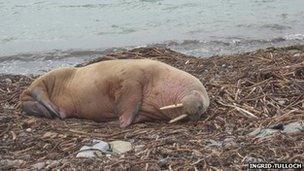Walrus basks in Orkney attention
- Published
The walrus was said to be enjoying the attention it has been getting
A walrus has turned up on a small Scottish island in what has been described as a "once-in-a-lifetime" event.
The animal, thought to be a young male, was spotted on the shoreline of North Ronaldsay in Orkney.
It appeared to be in good health and happy to be the centre of attention.
Wildlife experts said it was extremely unusual for a walrus to be spotted so far south of the North Pole and Arctic Ocean.
The animal was first discovered on Sunday morning by Mark Warren, an assistant warden at the North Ronaldsay Bird Observatory.
He told the BBC Scotland news website: "I was walking along the beach looking for birds, basically. At first I thought it was a dead whale so I threw a stone at it and it woke up.
"It does seem to be in OK health and certainly has plenty of battle scars which suggests it has been in a few scraps. A few people have suggested it might be quite a young one because its tusks aren't as big as some you see.
"You do get seals and sometimes killer whales around here, which people come and have a look at, but never a walrus".
Steve Sankey, who leads wildlife tours in the islands, said he had never before heard of one of the creatures turning up in Orkney.
He added: "It is extremely unusual indeed. Orkney should be well beyond the southern range of a walrus.

Walrus sightings are said to be extremely unusual in Orkney
"If you look back in history the early Scots used to go walrus hunting because ivory was a very valuable trading commodity, but they pushed them further and further north over the years".
Alan Jackson of the Orkney Marine-Life Aquarium said it had a walrus skull among its collection, but it was thought to have been brought back from Canada by a sea captain rather than having belonged to a local animal.
The large flippered marine mammals, characterised by their long tusks, spend significant amounts of their lives on the sea ice.
Their population dropped rapidly as they were widely killed by humans for their blubber, walrus ivory and meat during the 19th and 20th centuries.
However, their population rebounded after hunting them became largely outlawed.
- Published16 July 2011